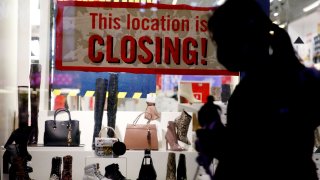
- Initial claims totaled 251,000 for the week ended July 16, up 7,000 from the week before and above the 240,000 Dow Jones estimate.
- That was the highest weekly level since mid-November.
- The Philadelphia Fed manufacturing index fell to a reading of -12.3, and produced the lowest employment reading since May 2021.
Initial jobless claims hit their highest level since mid-November last week, the latest sign that a historically tight labor market is beginning to slow, according to Labor Department data released Thursday.
Claims totaled 251,000 for the week ended July 16, up 7,000 from the week before and above the 240,000 Dow Jones estimate.
The gain brought filings for unemployment insurance to their highest weekly level since Nov. 13, 2021 and provided another indicator that a jobs market on fire in 2021 has begun to cool this year.
Get Southern California news, weather forecasts and entertainment stories to your inbox. Sign up for NBC LA newsletters.
Continuing claims, which run a week behind the headline number, increased to 1.384 million, the highest total since April 23.
A separate release Thursday also showed some weakness in the jobs picture.
The Philadelphia Fed manufacturing index fell to a reading of -12.3, a 9-point slide from a month ago and a considerably worse level than the 1.6 Dow Jones estimate. The number represents the percentage difference between companies reporting expansion in activity against those seeing contraction.
Money Report
In particular, the employment index was 19.4, also a 9-point decline. Though that indicates continued expansion in hiring, it is the lowest reading since May 2021 and also is indicative that hiring is slowing. The average workweek reading was 6.4, falling for the fourth consecutive month and an indication that productivity could be declining.
Companies in the survey reported higher costs for salaries, with 78.6% saying they have increased wages and compensation over the past three months, with no respondents saying they cut.
The survey also showed inflation pressures still high but cooling. The prices paid and prices received indexes both fell from a month ago but remained elevated, with respective readings of 52.2 and 30.3.
The data comes with uncertainty running high about the direction of the economy.
Employment has been the primary bright spot, with nonfarm payroll gains averaging a robust 457,000 a month through the first half of the year. However, those increases have been slowing lately, with the last three months averaging 375,000.
Most other data indicates the U.S. could be in the midst of meeting the rule-of-thumb definition for a recession, with two consecutive quarters of negative growth. Gross domestic product fell 1.6% in the first quarter and is on track to decline another 1.6% in Q2, according to the Atlanta Federal Reserve.
Fed officials are expected next week to raise interest rates another 0.75 percentage point, taking benchmark overnight borrowing rates up to a range of 2.25%-2.5%. The Fed is seeking to slow an economy that has produced the highest inflation rate since 1981.
Correction: The Philadelphia Fed manufacturing index fell to a reading of -12.3, a 9-point slide from a month ago. An earlier version misstated the time period.






